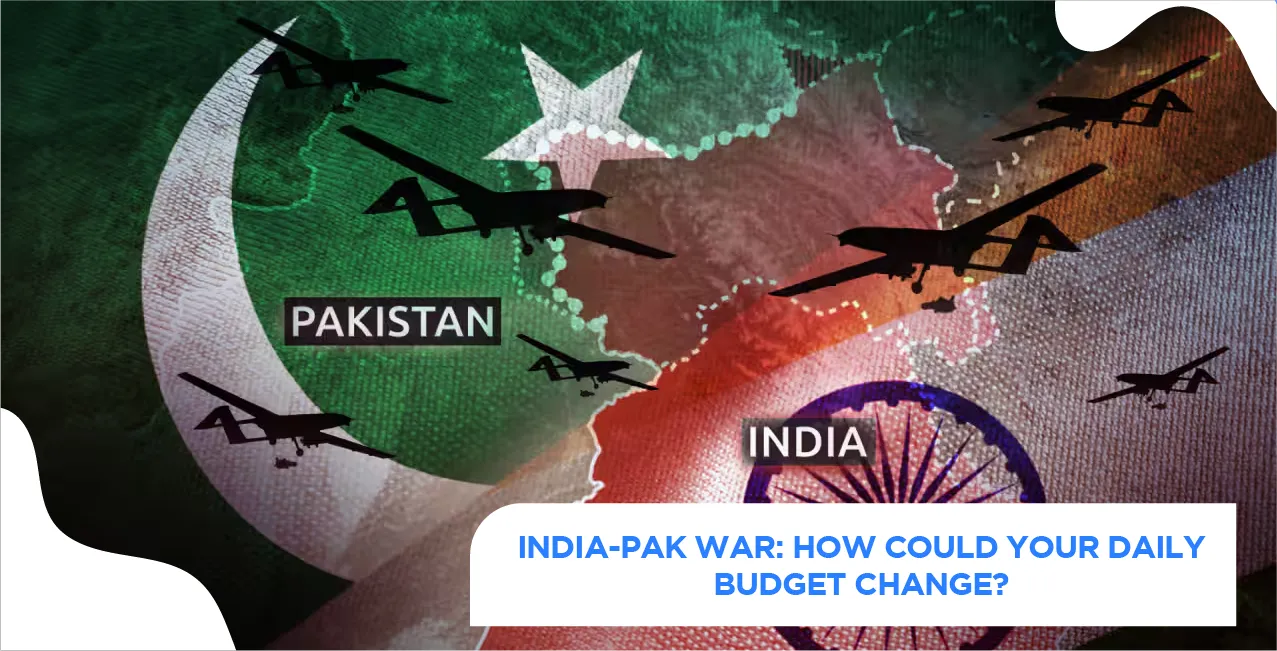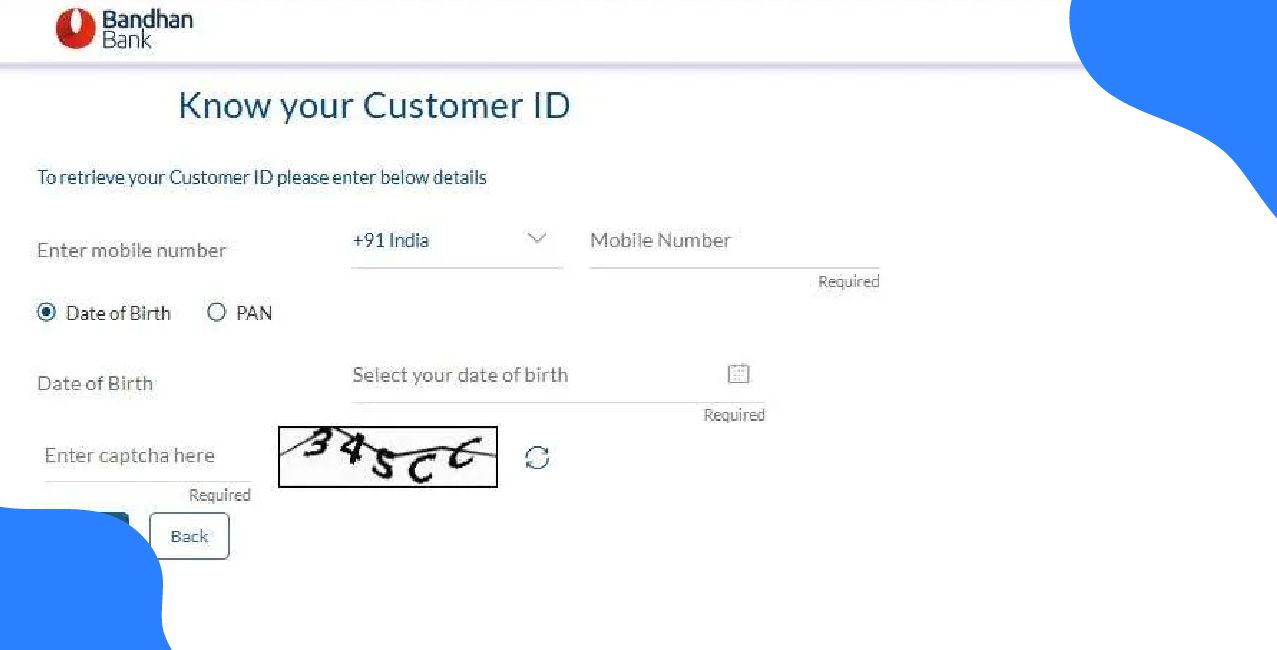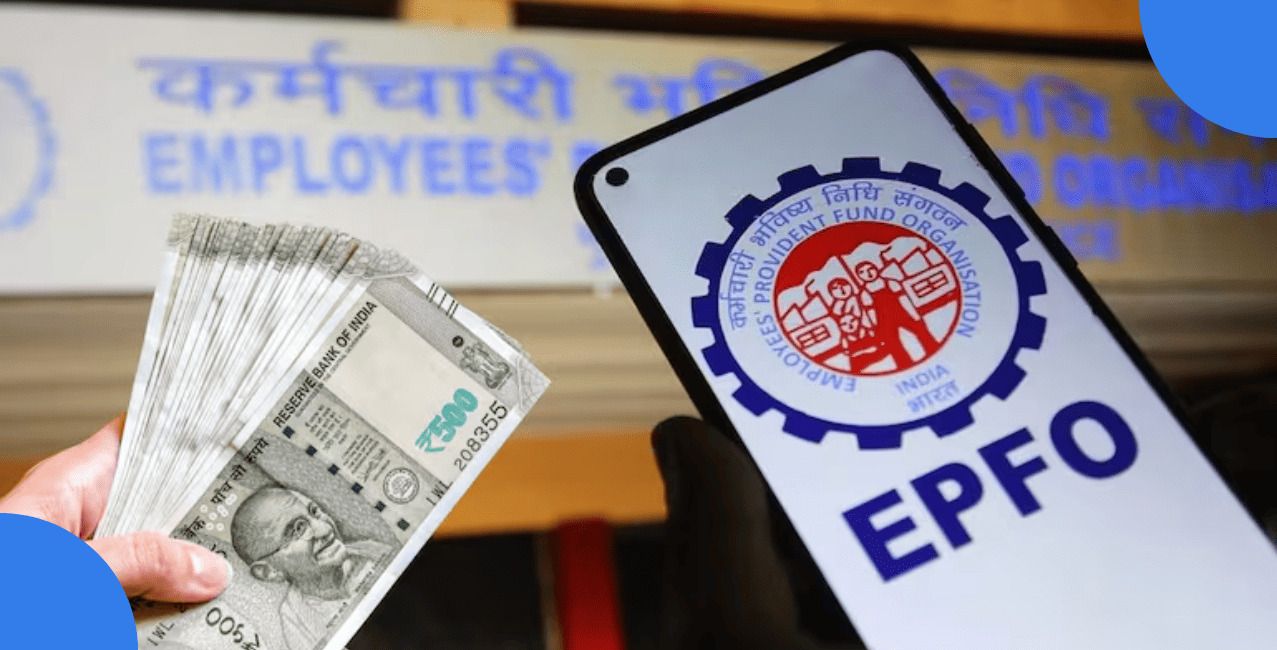India-Pak War: How Could Your Daily Budget Change?

Check Your Loan Eligibility Now
By continuing, you agree to LoansJagat's Credit Report Terms of Use, Terms and Conditions, Privacy Policy, and authorize contact via Call, SMS, Email, or WhatsApp
We are all aware of the current situation between India and Pakistan. Such tensions are no longer limited to strategies and soldiers. Their effect will reach every household.
Our daily household budget will change, affecting our grocery bills, fuel expenses, electricity costs, and job security.
Madhu’s daily grocery budget is around ₹420. But in a conflict situation, it can easily stretch to ₹570 as supplies, imports, and transport will be disrupted.
Given the current situation, our country is paying more attention to its security, and we must pay more attention to managing our spending.
How Does Conflict Affect Your Monthly Expenses?
Most of us get scared when we hear the word ‘war’. In such a situation, it is very common for supplies to slow down and prices to increase.
Yamini has 4 members in her family. Let’s have a look at her monthly household budget, before and after the conflict:
Item | Before (₹) | After (₹) | Increase (%) |
Groceries and Food | 7,200 | 9,500 | 31.9% |
Cooking Gas | 1,100 | 1,680 | 52.7% |
Fuel (Petrol and Diesel) | 4,200 | 6,050 | 44% |
Electricity | 1,900 | 2,300 | 21% |
Mobile and Internet | 1,300 | 1,300 | 0% |
Miscellaneous | 1,500 | 1,900 | 26.7% |
Total | 17,200 | 22,730 | 32% |
Sometimes, when situations worsen, our savings also become insufficient to fill the gap.
What Happens To Salaries And Jobs?
Most corporations slow down hiring, pause bonuses, and postpone promotions during a war-like situation.
In the Kargil War (1999), sectors such as manufacturing and IT saw a decrease in hiring of around 38%. Now, the impact might be broader due to global connections and the involvement of more services.
Let’s look at the estimated impact on job sector-wise:
Industry | Expected Job Cut (%) | Salary Freeze (%) |
Manufacturing | 35% | 60% |
IT Services | 20% | 50% |
Retail and Logistics | 30% | 45% |
Hospitality | 50% | 75% |
Finding a job in such situations will be more challenging if you are a fresher or a contract employee.
Grocery Bills And Food Stockpiling
You might know that in conflict situations, various businesses face problems such as delivery delays and more. Due to such issues, companies have to increase the price of their remaining stock.
Areas close to the border are already seeing a rise in the prices of grocery items, which is causing panic across states.
Aanchal lives in Jodhpur. A state in Rajasthan near the India and Pakistan border. Let’s look at the price movement in her state as soon as the war-like situation was announced:
Item | Current Price | Expected Price | Difference |
Wheat (1 kg) | ₹27 | ₹37 | ₹10 |
Cooking Oil (1 Ltr) | ₹124 | ₹159 | ₹35 |
Onion (1 kg) | ₹19 | ₹29 | ₹10 |
Tomato (1 kg) | ₹27 | ₹39 | ₹12 |
Milk (1 Ltr) | ₹53 | ₹61 | ₹8 |
Insurance And War Clause Confusion
Most insurance policies do not cover the damage related to war. If you think that you and your family are covered by insurance, then you might face difficulty during claims in such situations.
Let’s have a look at the limitations in insurance at the time of war:
Type of Insurance | War Coverage | Rider Required | Notes |
Term Life | No | Yes | Death during the war is not covered. |
Health | No | Yes | Excludes all injuries related to war. |
Car or Two Wheeler | No | Yes | Do not pay damages due to war. |
Home | No | Yes | In a few plans, a rider is available. |
Transport, Fuel, And Travel: Going The Extra Mile Costs More
Due to such serious situations, you might start panic buying. As a result, prices increase quickly.
Let’s have a look at the estimated rise in prices:
Item | Prices Before | Prices After | Increase |
Domestic Airfare (avg) | ₹4,200 | ₹5,600 | 33% |
Diesel (per litre) | ₹90 | ₹114 | 26.7% |
Petrol (per litre) | ₹96 | ₹120 | 33% |
Aviation Turbine Fuel | ₹108 | ₹140 | 29.6% |
How To Protect Your Daily Budget?
The following budgeting tips will help you in managing your monthly budget during a war situation:
- For some time you must stop spending money on luxury items.
- Always keep emergency cash of ₹10,000 with you. In case digital payment systems slow down or banks remain closed.
- You should contact your agent and review your insurance policy to see if riders are available for war-like risks.
- You must spend on only necessary items, and cut down spending on all extras such as dine-outs, online ordering, etc.
- You must buy basic household items in bulk and store them. Purchase items such as pulses, rice, flour, and many more in bulk to save on increasing prices.
Final Thoughts
You might not get directly affected by conflict but in many ways, it is affecting you indirectly. With the increase in prices and stricter rules to follow, we have to make adjustments to our lifestyle.
Most of us do our monthly budget planning at the start of the month. But in such a situation we have to revisit our budget planning and make necessary changes.
It is important in war-like situations to always keep emergency cash at home so that we can avoid future uncertainty. Preparing ahead and staying informed will help us tackle such situations easily.
FAQs
1. Will my insurance policies be valid during war?
Not necessarily. You need to check with your insurance agent.
2. Will war affect grocery prices?
Yes, such a situation is most likely to increase the grocery prices.
3. Are EMI payments expected to be delayed due to war?
Well, banks have not announced any relief yet. So, you must pay your EMI timely.
4. Will my job offer get cancelled or delayed due to the current war scenario?
You must ask the company about this as many sectors freeze hiring in such scenarios.
About the author

LoansJagat Team
Contributor‘Simplify Finance for Everyone.’ This is the common goal of our team, as we try to explain any topic with relatable examples. From personal to business finance, managing EMIs to becoming debt-free, we do extensive research on each and every parameter, so you don’t have to. Scroll up and have a look at what 15+ years of experience in the BFSI sector looks like.
Subscribe Now
Related Blog Post
Recent Blogs
All Topics
Contents
Quick Apply Loan
Consolidate your debts into one easy EMI.
Takes less than 2 minutes. No paperwork.
10 Lakhs+
Trusted Customers
2000 Cr+
Loans Disbursed
4.7/5
Google Reviews
20+
Banks & NBFCs Offers
Other services mentioned in this article



.png)




